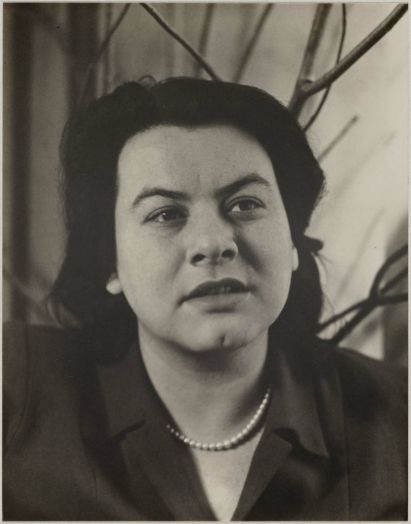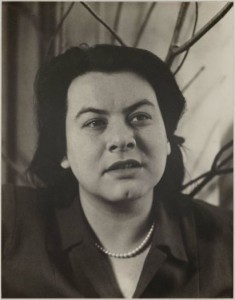
 |
| Muriel Rukeyser |
I have been asked very often, “Don’t you care about rhyme?” I do and I don’t. That is, I care about the recurrence of sound deeply, deeply, and rhyme has never been enough for me. Rhyme, the European way, is a return of sound once in a poem. I have, in my greed, wanted more than that, wanted modulation of sound changing, climbing as I think of it. On the page it’s going down the page, but somehow as one hears the poem, it’s climbing up and up and up until one reaches a kind of tonic sound, which is the last word in the poem for me. In rewriting, I have tried always to strengthen the sound structure and to make a dense fabric, of sound, of fact, of reality, and truth.
[…]
We are in the midst of a huge reaction against the formalism of rhyme in poetry so that a lot of our contemporary poems are way off on the other side and are, I hesitate to say this, really kind of notebook jottings. Brilliant, full of perception, but without the sound structure in which a deep strength fuses with the literal meanings. The movement of meaning is surely the music of poetry. There isn’t any music as we mean music, but there is that movement in the body and the soul, if you like. And one longs for it; it is a deep pleasure and a deep life to us, and there is this union of a physical life and a mental life that comes to us in poetry, and the physical life is bound up with sound in that way.
[…]
[I]t seems to me that the invitation of poetry is to bring your whole life to this moment, this moment is real, this moment is what we have, this moment in which we face each other, and if the poem is any damn good at all, it invites you to bring your whole life to that moment, and we are good poets inasmuch as we bring that invitation to you, and you are good readers inasmuch as you bring your whole life to the reading of the poem. And the process is the same for both of us. In that way, we are exactly alike. We are different in what we do—the writing of the poem is of course different. But it involves the same process; it’s just coming at it from the other side of the mirror.
—Muriel Rukeyser, Interview, February 22, 1978 (in Poetry in Person: Twenty-five Years of Conversation with America’s Poets)

 Joseph Hutchison, Colorado Poet Laureate 2014-2019, has published 20 collections of poems and edited or co-edited three poetry anthologies. He currently directs two master’s-level programs for University College at the University of Denver: Professional Creative Writing and Arts & Culture Management. Joe lives with his wife, Melody Madonna, in the mountains southwest of Denver, Colorado, the city where he was born.
Joseph Hutchison, Colorado Poet Laureate 2014-2019, has published 20 collections of poems and edited or co-edited three poetry anthologies. He currently directs two master’s-level programs for University College at the University of Denver: Professional Creative Writing and Arts & Culture Management. Joe lives with his wife, Melody Madonna, in the mountains southwest of Denver, Colorado, the city where he was born. 










I agree! They are equally excellent in complete different ways….
I feel that Rukeyser should be spoken of in same breath as Elizabeth Bishop. But it's not the case as yet.
Rukeyser seems to be fully back now. Her Collected Poems is in print in both cloth and paper, and Adrienne Rich edited a fine Selected Poems for the Library of America. She is by no means my favorite poet, but I admire how completely she went her own way in subject matter and form.
Great Rukeyser quotes. Inasmuch as a great deal of Rukeyser's poetry was written in something other than conventional regulated forms, I take what she's saying not to be a plea to return to writing sonnets etc., but rather what she says at face value — that the music in a poem is one of its essential qualities.<br /><br />The panel on Rukeyser's life and work that I attended at AWP
"…a lot of our contemporary poems are way off on the other side and are, I hesitate to say this, really kind of notebook jottings. Brilliant, full of perception, but without the sound structure in which a deep strength fuses with the literal meanings."<br /><br />Hear, hear!<br /><br />Rukeyser seems to be proposing a return (if we've really ever left it)to a Dantean conception of